译林版小学英语五年级上册知识点(全)
- 格式:pdf
- 大小:1.28 MB
- 文档页数:15
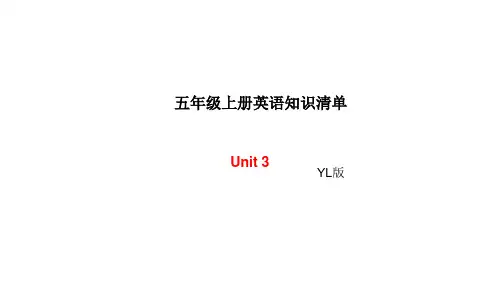
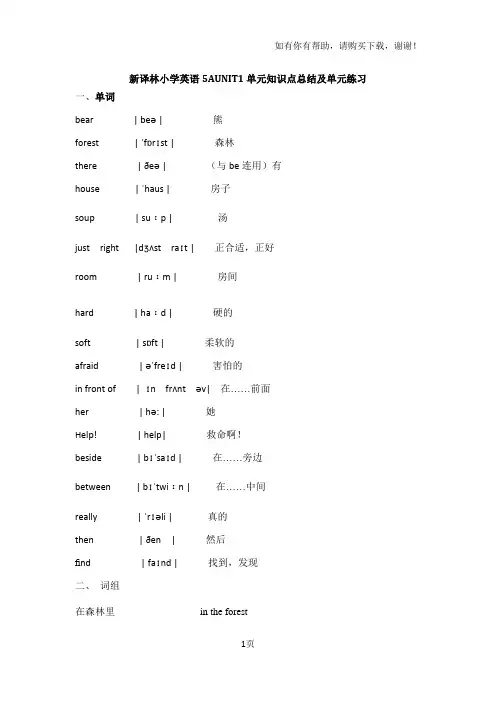
新译林小学英语5AUNIT1单元知识点总结及单元练习一、单词bear | beə | 熊forest | ˈfɒrɪst | 森林there | ðeə | (与be连用)有house | ˈhaus | 房子soup | suːp | 汤just right |dʒʌst raɪt | 正合适,正好room | ruːm | 房间hard | haːd | 硬的soft | sɒft | 柔软的afraid | əˈfreɪd | 害怕的in front of | ɪn frʌnt əv| 在……前面her | hə: | 她Help! | help| 救命啊!beside | bɪˈsaɪd | 在……旁边between | bɪˈtwiːn | 在……中间really | ˈrɪəli | 真的then | ðen | 然后find | faɪnd | 找到,发现二、词组在森林里in the forest三只熊在森林里three bears in the forest找到他们的表弟find their cousin在爸爸妈妈之间between father and mother 饥渴交加的熊thirsty and hungry bear房子旁边的熊the bear beside the house多么饥饿的两只狗啊!What two hungry dogs记住这20个新单词remember the twenty new words 在桌子上多的汤热啊!What hot soup on the desk 在冰箱里in the fridge多软的桃子啊!What soft peaches太开心了very happy在厨房里in the kitchen吃些蛋糕eat some cakes一座漂亮的老房子漂亮的房子an old beautiful house桌子上面有三把雨伞three umbrellas on the desk在中国很流行be popular in Chinain the front of 在....前面(外部前面)in front of 在...前部(里面的前面)三、拓展词组find 找到look for sth. 寻找look after 照看四、单元综合练习:1. 判断下列单词划线字母读音是否相同,相同的用S表示,不同的用D表示:( ) back many ( ) what water( ) forest Chinese ( )bear ear( )popular use ( )between great( ) child children ( ) lesson thank( ) cool book ( ) days cups( ) either eight ( )social cat()front on ()about cousin.( ) room livingroom ( ) her father( ) find kite2. 按要求完成下列题目:1.he(宾格)2. this(复数)3.let’s(完全形式)4.skating(原形)5.her(主格)6.goodbye(同义词)7.has(原形) 8.can(否定形式)9.too(同音词)10. Pear (同音词)_____11.Whose(同音词)______12. I (同音词)______。
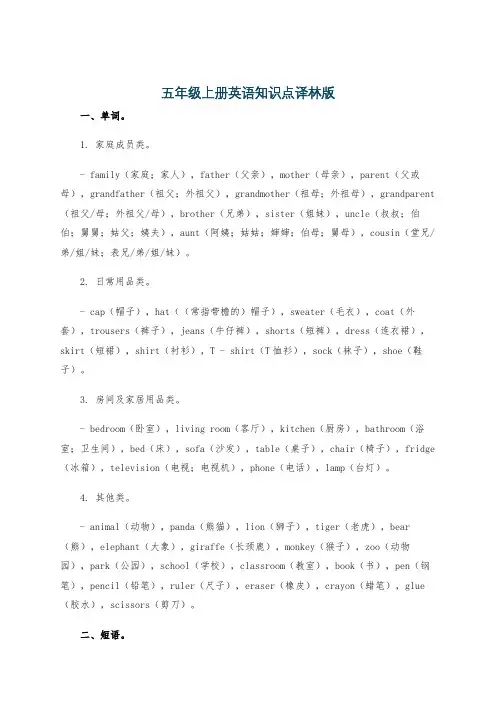
五年级上册英语知识点译林版一、单词。
1. 家庭成员类。
- family(家庭;家人),father(父亲),mother(母亲),parent(父或母),grandfather(祖父;外祖父),grandmother(祖母;外祖母),grandparent (祖父/母;外祖父/母),brother(兄弟),sister(姐妹),uncle(叔叔;伯伯;舅舅;姑父;姨夫),aunt(阿姨;姑姑;婶婶;伯母;舅母),cousin(堂兄/弟/姐/妹;表兄/弟/姐/妹)。
2. 日常用品类。
- cap(帽子),hat((常指带檐的)帽子),sweater(毛衣),coat(外套),trousers(裤子),jeans(牛仔裤),shorts(短裤),dress(连衣裙),skirt(短裙),shirt(衬衫),T - shirt(T恤衫),sock(袜子),shoe(鞋子)。
3. 房间及家居用品类。
- bedroom(卧室),living room(客厅),kitchen(厨房),bathroom(浴室;卫生间),bed(床),sofa(沙发),table(桌子),chair(椅子),fridge (冰箱),television(电视;电视机),phone(电话),lamp(台灯)。
4. 其他类。
- animal(动物),panda(熊猫),lion(狮子),tiger(老虎),bear (熊),elephant(大象),giraffe(长颈鹿),monkey(猴子),zoo(动物园),park(公园),school(学校),classroom(教室),book(书),pen(钢笔),pencil(铅笔),ruler(尺子),eraser(橡皮),crayon(蜡笔),glue (胶水),scissors(剪刀)。
二、短语。
1. 家庭相关短语。
- a big family(一个大家庭),a happy family(一个幸福的家庭),my family members(我的家庭成员),in my family(在我家里)。
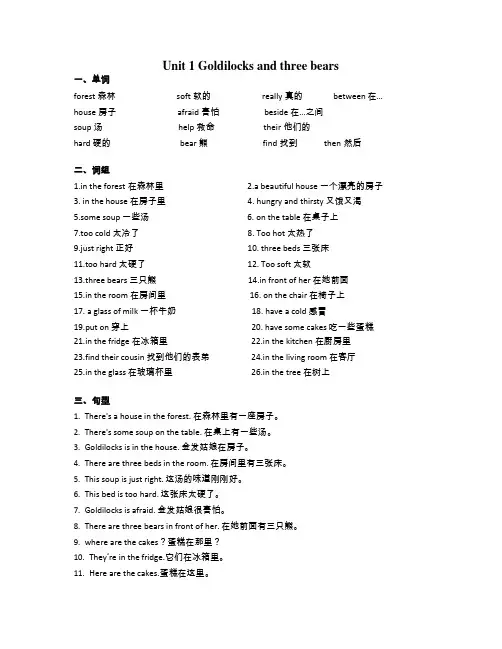
Unit 1 Goldilocks and three bears一、单词forest 森林soft 软的really 真的between 在…house 房子afraid 害怕beside 在…之间soup 汤help 救命their 他们的hard 硬的bear 熊find 找到then 然后二、词组1.in the forest 在森林里2.a beautiful house 一个漂亮的房子3. in the house 在房子里4. hungry and thirsty 又饿又渴5.some soup 一些汤6. on the table 在桌子上7.too cold 太冷了8. Too hot 太热了9.just right 正好10. three beds 三张床11.too hard 太硬了12. Too soft 太软13.three bears 三只熊14.in front of her 在她前面15.in the room 在房间里16. on the chair 在椅子上17. a glass of milk 一杯牛奶18. have a cold 感冒19.put on 穿上20. have some cakes 吃一些蛋糕21.in the fridge 在冰箱里22.in the kitchen 在厨房里23.find their cousin 找到他们的表弟24.in the living room 在客厅25.in the glass 在玻璃杯里26.in the tree 在树上三、句型1.There's a house in the forest. 在森林里有一座房子。
2.There's some soup on the table. 在桌上有一些汤。
3.Goldilocks is in the house. 金发姑娘在房子。
4.There are three beds in the room. 在房间里有三张床。
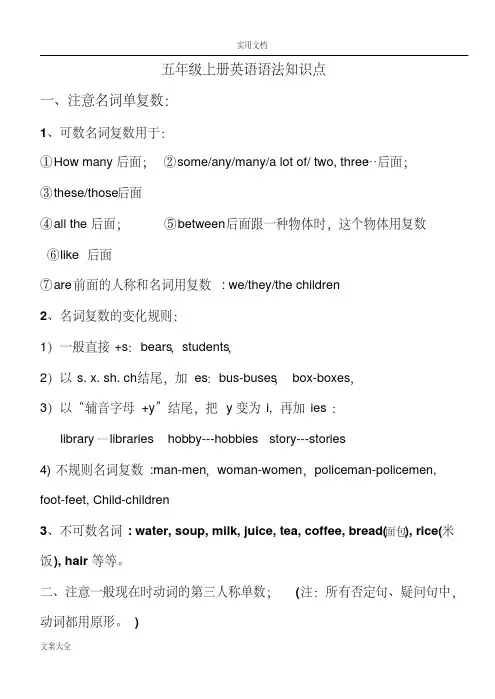
五年级上册英语语法知识点一、注意名词单复数:1、可数名词复数用于:①How many后面;②some/any/many/a lot of/ two, three…后面;③these/those后面④all the后面;⑤between后面跟一种物体时,这个物体用复数⑥like 后面⑦are前面的人称和名词用复数: we/they/the children2、名词复数的变化规则:1)一般直接+s:bears,students,2)以s. x. sh. ch结尾,加es:bus-buses,box-boxes,3)以“辅音字母+y”结尾,把y变为i, 再加ies:library—libraries hobby---hobbies story---stories4)不规则名词复数:man-men,woman-women,policeman-policemen, foot-feet, Child-children3、不可数名词: water, soup, milk, juice, tea, coffee, bread(面包), rice(米饭), hair等等。
二、注意一般现在时动词的第三人称单数;(注:所有否定句、疑问句中,动词都用原形。
)1、肯定句中哪些情况下用第三人称单数:(俗称:三单)1)人称代词he, she, it作主语时;2)单个人名、地名或称呼作主语时;3)单数可数名词或"this / that / the+单数可数名词" 作主语时;4)不可数名词作主语时;5、当数字或字母作主语时,等等。
2、动词第三人称单数变化规则如下:1) 一般情况下,动词后面直接加s. 如:works / plays/ reads2) 以s. x. sh. ch 或o结尾的动词,在后面加es.例:teach-teaches, watch-watches, do-does, go-goes3) 以辅音字母+y结尾的动词, 把y变为i,再加es.例:study- studies fly-flies carry-carries4)不规则动词的第三人称单数:have—has;be—is三、人称代词、名词所有格及序数词单数复数一二三一二三主格I you he she It we you they 宾格me you him her It us you them 物主my your his her Its our your their代词我的你的他的她的它的我们的你们的他们的1、主格用来作句中的主语,用于动词前面。
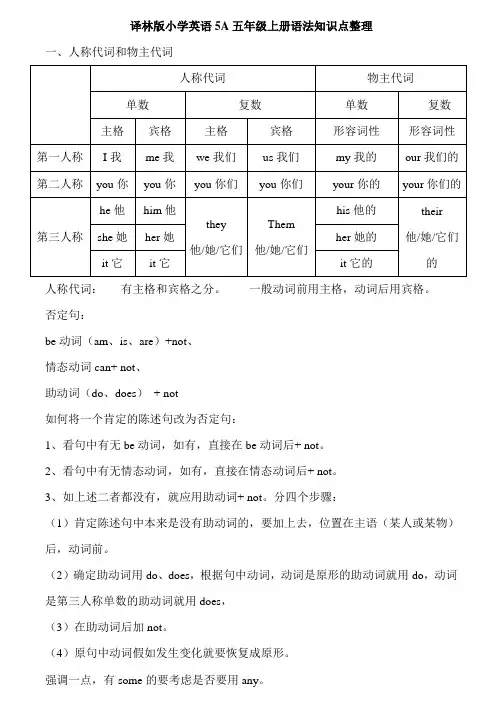
译林版小学英语5A五年级上册语法知识点整理一、人称代词和物主代词人称代词:有主格和宾格之分。
一般动词前用主格,动词后用宾格。
否定句:be动词(am、is、are)+not、情态动词can+ not、助动词(do、does)+ not如何将一个肯定的陈述句改为否定句:1、看句中有无be动词,如有,直接在be动词后+ not。
2、看句中有无情态动词,如有,直接在情态动词后+ not。
3、如上述二者都没有,就应用助动词+ not。
分四个步骤:(1)肯定陈述句中本来是没有助动词的,要加上去,位置在主语(某人或某物)后,动词前。
(2)确定助动词用do、does,根据句中动词,动词是原形的助动词就用do,动词是第三人称单数的助动词就用does,(3)在助动词后加not。
(4)原句中动词假如发生变化就要恢复成原形。
强调一点,有some的要考虑是否要用any。
二、一般疑问句。
如何将一个肯定的陈述句改为一般疑问句:1、看句中有无be动词,如有,把be动词提到句首即可。
2、看句中有无情态动词,如有,把情态动词提到句首即可。
3、如上述二者都没有,就应把助动提到句首。
分四个步骤:(1)肯定陈述句中本来是没有助动词的,要加上去,位置在主语(某人或某物)后,动词前。
(2)确定助动词用do还是does,根据句中动词,动词是原形的助动词就用do,动词是第三人称单数的助动词就用does(3)把助动词后提到句首。
(4)原句中动词假如发生变化就要恢复成原形。
强调一点,有some的要考虑是否要用any。
三、特殊疑问句。
表示疑问,有疑问词(在开头),回答有很多种可能。
常用疑问词:。
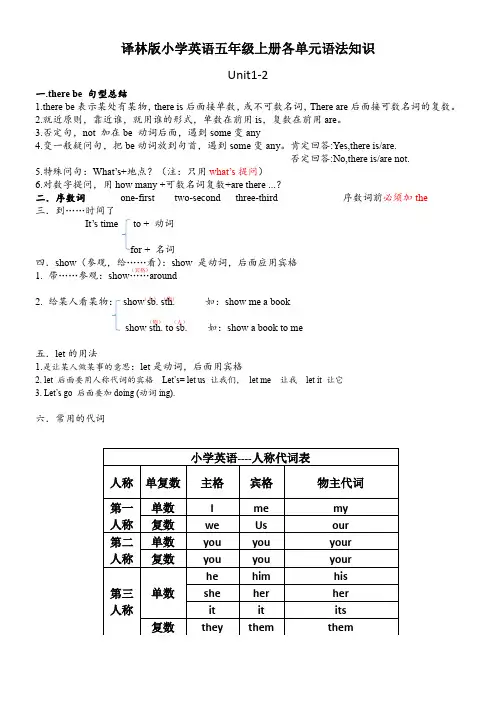
(宾格) (人) (物) (物) (人) 译林版小学英语五年级上册各单元语法知识Unit1-2一.there be 句型总结1.there be 表示某处有某物,there is 后面接单数,或不可数名词,There are 后面接可数名词的复数。
2.就近原则,靠近谁,就用谁的形式,单数在前用is ,复数在前用are 。
3.否定句,not 加在be 动词后面,遇到some 变any4.变一般疑问句,把be 动词放到句首,遇到some 变any 。
肯定回答:Yes,there is/are.否定回答:No,there is/are not.5.特殊问句:What’s+地点?(注:只用what’s 提问)6.对数字提问,用how many +可数名词复数+are there ...?二.序数词 one -first two -second three -third 序数词前必须加the三.到……时间了It’s time to + 动词for + 名词四.show (参观,给……看):show 是动词,后面应用宾格1. 带……参观:show ……around2. 给某人看某物: show sb. sth. 如:show me a bookshow sth. to sb. 如:show a book to me五.let 的用法1.是让某人做某事的意思:let 是动词,后面用宾格2. let 后面要用人称代词的宾格 Let’s= let us 让我们, let me 让我 let it 让它3. Let’s go 后面要加doing (动词ing).六.常用的代词Unit3-4一.have ,has 的用法1.当主语是第三人称单数时,用has,包括he ,she,it.人的名字,单个的人或物体2.当主语是第一、二人称(I/you/we/they,)以及复数时,用have3.否定句:在动词have前加don’t 主语+ don’t + have +.........+ 动词用原形(have)has前加doesn’t 主语+ doesn’t + have+ ........3.一般疑问句,在句首加Do+ 主语+ have(动词原形)……?Does❖如句子中有和“我有关的”第一人称人称需改成和“你”有关的第二人称人称。
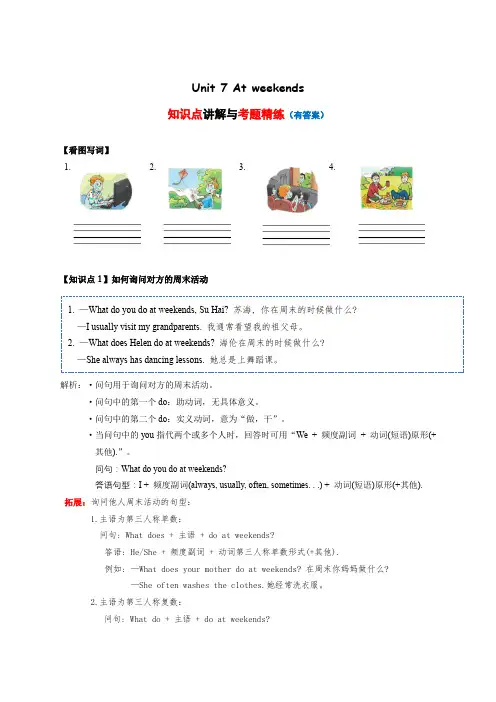
Unit 7 At weekends知识点讲解与考题精练(有答案)【看图写词】1. 2. 3. 4.【知识点1】如何询问对方的周末活动1. —What do you do at weekends, Su Hai?苏海, 你在周末的时候做什么?—I usually visit my grandparents. 我通常看望我的祖父母。
2. —What does Helen do at weekends? 海伦在周末的时候做什么?—She always has dancing lessons. 她总是上舞蹈课。
解析:·问句用于询问对方的周末活动。
·问句中的第一个do:助动词,无具体意义。
·问句中的第二个do:实义动词,意为“做,干”。
·当问句中的you指代两个或多个人时,回答时可用“We + 频度副词+ 动词(短语)原形(+其他).”。
问句:What do you do at weekends?答语句型:I + 频度副词(always, usually, often, sometimes. . .) + 动词(短语)原形(+其他).拓展:询问他人周末活动的句型:1.主语为第三人称单数:问句: What does + 主语 + do at weekends?答语: He/She + 频度副词 + 动词第三人称单数形式(+其他).例如: —What does your mother do at weekends? 在周末你妈妈做什么?—She often washes the clothes.她经常洗衣服。
2.主语为第三人称复数:问句: What do + 主语 + do at weekends?答语: They + 频度副词 + 动词(短语)原形(+其他).例如: —What do your parents do at weekends? 在周末你父母做什么?—They sometimes visit my grandparents.他们有时拜访我(外)祖父母。
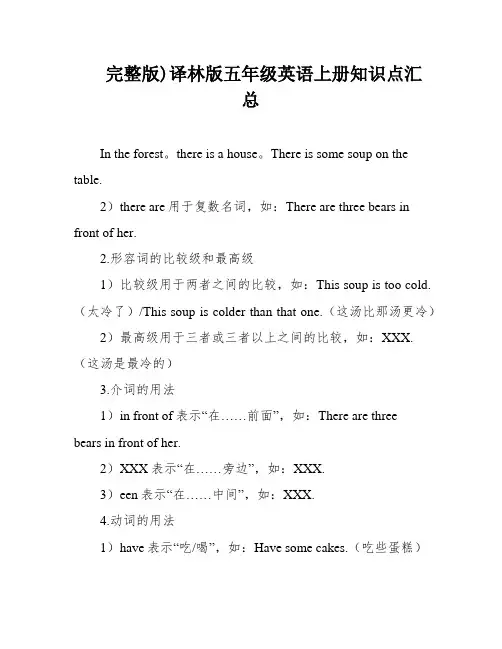
完整版)译林版五年级英语上册知识点汇总In the forest。
there is a house。
There is some soup on the table.2)there are用于复数名词,如:There are three bears in front of her.2.形容词的比较级和最高级1)比较级用于两者之间的比较,如:This soup is too cold.(太冷了)/This soup is colder than that one.(这汤比那汤更冷)2)最高级用于三者或三者以上之间的比较,如:XXX.(这汤是最冷的)3.介词的用法1)in front of表示“在……前面”,如:There are three bears in front of her.2)XXX表示“在……旁边”,如:XXX.3)een表示“在……中间”,如:XXX.4.动词的用法1)have表示“吃/喝”,如:Have some cakes.(吃些蛋糕)2)find表示“找到/发现”,如:Find their cousin.(发现他们的表弟)3)can/cannot(can’t)表示“能/不能”,如:Bobby cannot see any cakes in the fridge.(XXX看不到冰箱里有蛋糕)小改写:1.在森林里有一座房子。
There is a house in the forest.2.桌子上有一些汤。
There is some soup on the table.3.在她的前面有三只熊。
There are three bears in front of her.4.这汤太冷了。
This soup is too cold.5.多么漂亮的房子!What a beautiful house!6.她又饿又渴。
XXX.7.XXX看不到冰箱里有蛋糕。
Bobby cannot see any cakes in the fridge.In the school bag。
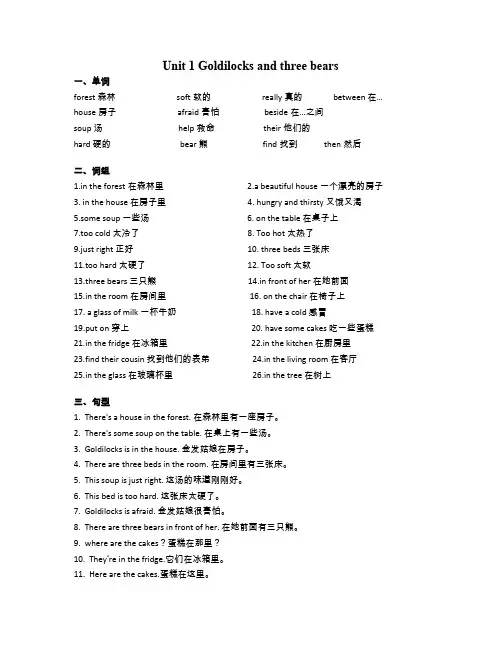
Unit 1 Goldilocks and three bears一、单词forest 森林 soft软的 really真的 between 在…house房子 afraid害怕 beside在…之间soup汤 help救命 their他们的hard 硬的 bear 熊 find找到 then然后二、词组1.in the forest在森林里2.a beautiful house一个漂亮的房子3. in the house 在房子里4. hungry and thirsty 又饿又渴5.some soup 一些汤6. on the table 在桌子上7.too cold 太冷了 8. Too hot 太热了9.just right 正好 10. three beds 三张床11.too hard 太硬了 12. Too soft 太软13.three bears 三只熊 14.in front of her 在她前面15.in the room 在房间里 16. on the chair 在椅子上17. a glass of milk 一杯牛奶 18. have a cold 感冒19.put on 穿上 20. have some cakes 吃一些蛋糕21.in the fridge 在冰箱里 22.in the kitchen 在厨房里23.find their cousin 找到他们的表弟 24.in the living room 在客厅25.in the glass 在玻璃杯里 26.in the tree 在树上三、句型1. There's a house in the forest. 在森林里有一座房子。
2. There's some soup on the table. 在桌上有一些汤。
3. Goldilocks is in the house. 金发姑娘在房子。
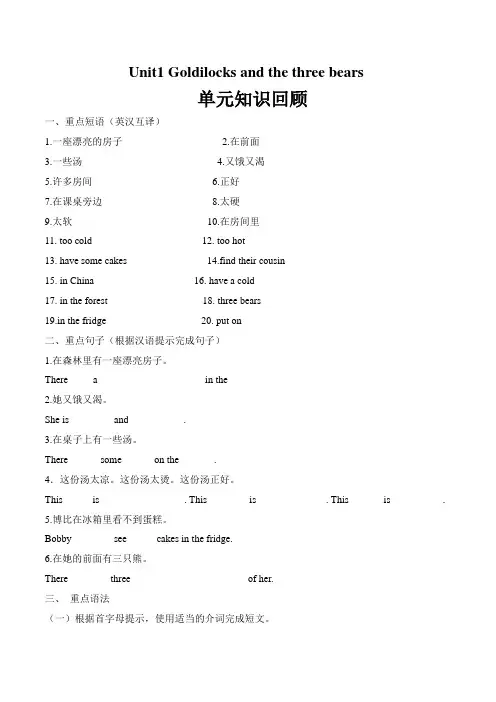
Unit1 Goldilocks and the three bears单元知识回顾一、重点短语(英汉互译)1.一座漂亮的房子___________2.在前面_______________3.一些汤___________________4.又饿又渴____________________5.许多房间_______________6.正好________________________7.在课桌旁边__________________ 8.太硬_____________9.太软_____________________ 10.在房间里_________________11. too cold___________ 12. too hot__________13. have some cakes______________ 14.find their cousin______________15. in China__________________ 16. have a cold__________________17. in the forest_______________ 18. three bears___________________19.in the fridge_______________ 20. put on___________________二、重点句子(根据汉语提示完成句子)1.在森林里有一座漂亮房子。
There_____a_________ _________ in the________2.她又饿又渴。
She is_________and___________.3.在桌子上有一些汤。
There______ some______ on the_______.4.这份汤太凉。
这份汤太烫。
这份汤正好。
This______is_____ _________. This________ is______ ______. This_______is____ ______.5.博比在冰箱里看不到蛋糕。
Unit2 A new student一、重点词组a new student一名新学生show…around带……参观how many classrooms多少间教室in our school在我们学校our classroom我们的教室on the second floor在二楼computer room电脑房music room音乐室on the third floor在三楼(1,一般情况下,序数词前要加the;2,在几楼用介词on)table tennis room乒乓球室on the first floor在一楼art room美术室in the playground在操场上have a look看一看push me推我on the swing在秋千上too high太高so heavy很重go home回家great fun非常有趣二、重点句型1. Can you show her around? 你能带领她参观一下吗?2. How many classrooms are there in our school? 在我们学校有多少间教室?There are 24 classrooms. 有24间教室。
3. Our classroom is on the second floor. 我们的教室在二楼。
4. Are there any computer rooms? 有一些电脑房吗?Yes, there are. / No, there aren’t. 有。
/ 没有。
5. Is there a music room? 有一间音乐室吗?Yes, there is. / No, there isn’t. 有。
/ 没有。
6. It’s on the first floor. 它在一楼。
7.Let’s go and have a look. 让我们去看一看吧。
8.Bobby and Sam are in the playground. 波比和萨姆在操场上。
江苏译林版小学五年级英语上册复习资料(含知识点、语法知识、练习题、易错题及作文)江苏译林版英语五年级上册知识点整理及练习Unit 1Goldilocksandthethreebears一、单词(默写)1.bear熊2.forest森林3.there(与be连用)有4.house房子5.soup 汤6.justright正合适7.room房间8.hard硬的9.soft柔软的10.afraid 害怕的11.their他们的12.her她(宾格)13.help救命14.beside 在……旁边15.between在……中间16.really真正地17.then然后18.find找到,发现19.infrontof在……前面二、词组(默写)1、intheforest在森林里2、abeautifulhouse一座漂亮的房子3、hungryandthirsty又饿又渴4、somesoup一些汤5、toocold/hot太冷/热6、intheroom在房间里7、toohard/soft太硬/软8、threebears三只熊9、havesomecakes吃些蛋糕10、inthekitchen在厨11、inthefridge在冰箱里12、findtheircousin 发现他们的表弟三、句型(默写)1.Thereisahouseintheforest.在森林里有一个房子。
2.Thereissomesouponthetable.在桌子上有一些汤。
3.Therearethreebearsinfrontofher.在她前面有三只熊。
4.Thissoupistoocold.这汤太冷了。
5.Whatabeautifulhouse!多么漂亮的房子!6.Sheishungryandthirsty.她是又饿又渴。
7.Bobbycannot(can’t)seeanycakesinthefridge.波比看不到冰箱里有蛋糕。
四.语法点(理解)1.Therebe句型表示“某处有某物”(1)其中thereis用于单数名词或不可数名词,如:Thereisapencilcaseintheschoolbag.Thereissomesoup/milk/tea/coffee/ juice/water/chocolate.(2)Thereare用于可数名词的复数,如:Therearesomedesksintheclassroom.(3)Therebe句型的就近原则:be动词后面如果跟的是不止一种物品,就根据离它最近的物品选用is或are.如:Therearesomepicturesandatelephone.Thereisatelephoneandsomepict ures.2.Therebe句型的否定形式:在be动词的后面加not(isnot可以缩写为isn”t,arenot可以缩写为aren”t)把some改成any。
译林小学英语五上Unit7At weekends重点短语、句子、知识点附默写纸一、词组在周末at weekends看望我的爷爷奶奶visit my grandparentslike playing with their cat喜欢和他们的猫一起玩很,非常very muchhave dinner with our grandparents和我们的祖父母吃晚饭住在英国live in the UK和他们在网上聊天chat with them on the Internet上舞蹈课have dancing lessonsgo to the cinema with her friends和她的朋友们一起去电影院非常喜欢猫like cats very much放风筝fly a kite看电视watch TV我们的父母our parents吃很多eat a lot住在英国live in the UK打篮球play basketball在网上聊天chat on the Internet去游泳go swimming和刘涛一起踢足球play football with Liu Taogo to the park with my family和我的家人一起去公园放风筝fly a kite=fly kites拜访罗斯先生visit Mr Roseshow us all the lovely roses向我们展示所有可爱的玫瑰种花grow flowers很流行very popular在中国in China在周末看电视watch TV at weekends吃很多eat a lot吃很多苹果eat a lot of apples喜欢踢足球like playing basketball去游泳go swimming喜欢游泳like swimming在春天/夏天/秋天/冬天in spring/summer/autumn/winter野餐have a picnic=have picnics喜欢野餐like picnics太胖too fat出去get out出去come out二、句子你在周末做什么?What do you do at weekends?海伦在周末做什么?What does Helen do at weekends?I often have dinner with my grandparents. 我经常和我的祖父母一起吃晚饭。
小学英语五年级上册bear [bA4]n. 熊vt. 忍受,负荷,使跌价,怀有,产生vi. 忍受,结果实,转向,开动,压迫forest ['f3rist]n. 森林,林木vt. 植树于there [0A4](与be连用)有house [haus]n. 房子,住宅,机构,家庭,家族,议院vt.给...房子住,收藏vi. 住,躲藏soup [su:p]n. 汤,马力vt. 加速,增加马力room [ru:m, rum]n. 房间,空位,场所vi. 住宿,居住vt. 留宿soft [s3ft]a. 软的,温和的,柔和的,柔滑的,温柔的,纸币的,坡度小的,软弱的n. 柔软的东西,笨人ad. 柔软地,温和地afraid [4'freid]a. 害怕的,恐怕,遗憾her [h4:, h4]pron. 她的,她beside [bi'said]prep. 在旁边between [bi'twi:n]prep. 在...之间really ['ri4li]ad. 实际上,真实地,实在then [0en]ad. 然后,当时conj. 然后,当时n. 那时find [faind]vt. 发现,感到,得到,认为vi. 裁决n. 发现v. 查找their [0A4]pron. 他们的student ['stju:d4nt]n. 学生,研究者,学者classroom ['kla:srum]n. 教室second ['sek4nd]n. 秒,瞬间,第二名,赞成,助手,支持者a. 第二的,其次的,多余的,辅助的,附加的,次要的num. 第二vt. 当...助手,支持floor [fl3:]n. 地板,楼层,底部,底价vt. 铺地板,打倒n. 基底computer [k4m'pju:t4]n. 电脑,电子计算机third [74:d]num. 第三,三分之一first [f4:st]ad. 首先,第一,优先a. 第一的num. 第一n. 开始,第一swing [swi6]n. 摇摆,振幅,音律,节奏,涨落,自由活动,旋转,秋千vi. 摇摆,悬挂,转向,大摇大摆地走,旋转vt. 挥舞,使旋转,使旋转,吊运,悬挂,使转向a. 旋转的,悬挂的,摇摆舞乐的push [pu5]n. 推,推动,奋力,进取心,急迫,攻击vt. 推,推动,使伸出,增加,逼迫,推行vi. 推,推进,增加,努力争取heavy ['hevi]a. 重的,巨大的,阴沉的,笨重的,沉重的ad. 沉重地n. 重物,严肃角色stop [st3p]n. 停止,车站,逗留,填塞,风琴的音栓,滞留,障碍vi. 停止,被塞住vt. 塞住,堵塞,阻止,难倒,击落,断绝,终止,停止high [hai]n. 高度,高处a. 高的,高级的,主要的,高尚的,高原的,高音的,重大的,傲慢的,昂贵的ad. 高度地,奢侈地great [greit]a. 大的,非常的,主要的,重大的,崇高的,伟大的,强烈的,大写的ad. 顺利地,得意地n. 全部,大人物,大师just right正合适,正好in front of在...前面Help!救命啊!show...around带...参观body ['b3di]n. 身体,人,团体,主要部分vt. 赋以形体no [n4u]n. 不,拒绝,否决票a. 没有,不是,绝非ad. 不leg [leg]n. 腿,胫,路程vi. 走,跑or [3:, 4]conj. 也不,也没有arm [a:m]n. 手臂,袖子,海湾,武器vt. 武装,装备vi. 武装起来wing [wi6]n. 翅膀,翼,飞翔,飞行,派别,机翼vt. 装以翼,飞过,增加...速度,空运vi. 飞行foot [fut]n. 脚,步调,英尺,步兵,末尾,底部vt. 走在...上,给...换底,结算vi. 跳舞,步行,总计rabbit ['r1bit]n. 兔子vi. 猎兔vt. 该死give [giv]n. 弹性,适应性vt. 给,授予,供给,产生,发表,捐助,付出,让出,引起,献出vi. 捐赠,让步finger ['fi6g4]n. 手指,指状物,指针vt.vi. 用手指拨弄,伸出one...the other...一个...另一个...hobby ['h3bi]n. 嗜好,癖,爱好with [wi0]prep. 与,以,由于also ['3:ls4u]ad. 也,并且read [ri:d]vt.vi.读,阅读,朗读,学习,看懂,理解vbl. read的过去式和过去分词a. 有学问的n. 读取story ['st3:ri]n. 故事,小说,传奇,描述,阅历,经历,层,报道,真相dance [da:ns]n. 跳舞,舞蹈,舞会vt.vi. 跳舞both [b4u7]a. 两者的ad. 两者都pron. 两者sing [si6]vi. 唱,唱歌,演唱,鸣vt. 唱,歌颂n. 嗖嗖声group [gru:p]n. 团体,组,团,群vt.vi. 聚合,成群about [4'baut]ad. 大约,四处,在附近,周围prep. 有关,大约,关于idea [ai'di4]n. 主意,办法,理想,意见,概念,思想ice [ais]n. 冰,冰淇淋,糖衣,贿赂,矜持,冷若冰霜vt. 冰冻,覆以糖衣vi. 结冰hole [h4ul]n. 孔,洞,穴,漏洞vt. 挖洞,掘坑vi. 进洞,凿洞wet [wet]n. 湿气,潮湿,液体,雨天,水分a. 湿的,潮的,反对禁酒的,下雨的,搞错的vi. 变湿be good at擅长于a lot of很多play the piano弹钢琴watch films看电影look out当心!注意!teacher ['ti:t54]n. 教师,老师,导师teach [ti:t5]vt. 教,讲授,教导,教育vi. 教书,教学,被讲授writer ['rait4]n. 作家,记者,撰稿者,抄写员write [rait]vt. 书写,著述,写信给,写满vi. 写,写字,作曲,写作,写信n. 书写器work [w4:k]n. 工作,劳动,职业,行为,功,作品,工程,产品,成果vi. 工作,劳动,做,被加工,起作用,运转vt. 使工作,使转动,开动,使用,造成,使逐渐变动,经营doctor ['d3kt4]n. 医生,博士vt. 授以博士学位,诊断,修改vi. 行医help [help]n. 帮忙,帮助者,补救办法,助手vt. 帮助,帮忙,款待,治疗,接济vi. 有用,救命,招待sick [sik]n. 病人a. 不舒服,有病的,恶心的,病态的,渴望的,厌恶的vt. 呕吐,使狗去攻击people ['pi:pl]n. 人,人们,公民,人类vt. 使住满人factory ['f1kt4ri]n. 工厂,代理店worker ['w4:k4]n. 工人,劳动者,劳工cook [kuk]n. 厨子,厨师vt. 烹调,煮饭,加热vi. 在煮着driver ['draiv4]n. 驾驶,驱动器farmer ['fa:m4]n. 农夫,百姓nurse [n4:s]n. 护士,保姆,奶妈vt. 看护,照顾,栽培vi. 喂奶,看护病人policeman [p4'li:sm4n]n.pl. 警察at home在家send [send]vt. 送给,传,寄,使陷于,发射,派遣vi. 寄信,派人,播送,被波浪抬起n. 波浪的推进力v. 发送Email电子信箱to [tu:, tu, t4]prep. 到,向,趋于ad. 向前live [liv' laiv]a. 活的,生动的,精力充沛的,实况转播的vi. 活,生存,居住vt. 过着,度过,经历ad. 实况地UkUkrainestudy ['st8di]n. 学习,研究,学科,论文,求学,努力,试作,书房vt. 学习,读书,计划,考虑vi. 学习,试图Australia [3s'treilj4]n. 澳洲,澳大利亚Canada ['k1n4d4]n. 加拿大China ['t5ain4]n. 中国,瓷器a. 中国的us [8s, 4s]pron. 我们n. 美国tomorrow [t4'm3r4u]n. 明天,未来ad. 明天,未来地fishing ['fi5i6]n. 钓鱼,鱼业a. 钓鱼的sit [sit]vi. 坐,就座,坐落vt. 使就座,骑n. 坐wait [weit]n. 等候,埋伏vt. 等候,期待,推迟,伺候,延缓vi. 等,等候,耽搁,伺候用餐e-friend网友wait a minute等一会儿...years old...岁go fishing去钓鱼Don’t worry别担心by....在....旁边visit ['vizit]n. 拜访,访问,调查,视察,游览vt. 拜访,访问,降临,视察,参观vi. 访问,参观,闲谈grandparent ['gr1ndper4nt]n. 祖父或祖母,祖父母often ['3:fn]ad. 时常,常常chat [t51t]n. 闲谈vi. 闲谈,聊天internetn. 国际信息通信网always ['3:lweiz, '3:lw4z]ad. 总是,始终sometimes ['s8mtaimz]ad. 有时,时常,往往there [0A4]ad. 在那里at weekends在周末play with和...在一起玩very much非常go to the cinema去看电影a lot很多come out出来get out出来christmas ['krism4s]n. 圣诞节buy [bai]vt. 买,获得vi. 买n. 购买,买卖,交易present ['preznt]n. 礼物,现在,瞄准a. 现在的,出席的,当面的vt. 介绍,引见,赠送,上演,呈现vi. 举枪瞄准next [nekst]n. 下一个a. 下一个的,其次的,最近的ad. 然后,下次,最近put [put]vt. 放,摆,安置,移动,使穿进,发射,投掷,使处于,写上,提出,表达,使受vi. 出发,航行,发芽,击高尔夫球n. 掷,卖方的选择,怪人,笨蛋,轻轻一击(入洞)a. 固定不动的pretty ['priti]a. 漂亮的,可爱的,优美的,恰当的,狡猾的ad. 相当,颇thing [7i6]n. 事物,东西,物,用品,事,事件,行动,行为,情况look [luk]n. 一看,神色,样子,面容vi. 看,注意,朝着,显得vt. 打量,注视,注意,期待christmas ['krism4s]n. 圣诞节stocking ['st3ki6]n. 长袜finally ['fain4li]ad. 最后,终于early ['4:li]a. 早的,早熟的ad. 很早,初turkey ['t4:ki]n. 火鸡,无用的东西,土耳其pudding ['pudi6]n. 布丁all [3:l]a. 所有的,全部的ad. 全部,全然pron. 全部card [ka:d]n. 卡片,纸牌,梳棉机,明信片,节目单vt. 备置卡片,记于卡片上,梳理n. 卡片children ['t5ildr4n]n. 孩子,孩子们message ['mesid9]n. 消息,通讯,讯息,广告词,预言,教训vt. 通知vi. 带信息song [s36]n. 歌,曲,鸣声,诗歌,歌曲,歌唱him [him]pron. 他us [8s, 4s]pron. 我们n. 美国letter ['let4]n. 信,字母,证书,字,出租人,学问,文字vt. 写字母于,将...刻于字母,加上标题vi. 写印刷体字story ['st3:ri]n. 故事,小说,传奇,描述,阅历,经历,层,报道,真相after ['a:ft4]ad. 在...之后prep. 在...之后,依照conj. 在...之后Christmas tree圣诞树Father Christmas圣诞老人Christmas Day圣诞节wait for等候,等待have a good time过得愉快Merry Christmas圣诞快乐!What’s wrong with...?怎么了?hard ['ha:d]a. 难的,艰苦的,坚硬的,硬的,坚固的,猛烈的,艰难的,确实的ad. 努力地,辛苦地,坚硬地,牢固地,猛烈地,接近地。
译林英语五年级上册期末复习资料Unit 1 Goldilocks and the three bears一、单词(默写)1.bear熊2.forest森林3.there(与be连用)有4.house房子5.soup汤6.just right正合适7.room房间8.hard硬的9.soft柔软的10.afraid害怕的11. their他们的12.her她(宾格)13.help救命14.beside在……旁边15.between在……中间 16.really真正地17.then然后 18.find找到,发现19. in front of在……前面二、词组(默写)1、in the forest在森林里2、 a beautiful house一座漂亮的房子3、 hungry and thirsty又饿又渴4、some soup一些汤5、 too cold/hot太冷/热6、 in the room在房间里7、too hard/soft太硬/软8、three bears 三只熊9、have some cakes吃些蛋糕10、in the kitchen在厨房里11、 in the fridge在冰箱里12、find their cousin发现他们的表弟三、句型(默写)1. There is a house in the forest.在森林里有一个房子。
2. There is some soup on the table.在桌子上有一些汤。
3. There are three bears in front of her.在她前面有三只熊。
4. This soup is too cold.这汤太冷了。
5. What a beautiful house! 多么漂亮的房子!6. She is hungry and thirsty.她是又饿又渴。
7.Bobby cannot(can’t) see any cakes in the fridge. 波比看不到冰箱里有蛋糕。
Unit 1 Goldilocks and the three bears 重点单词bear 熊soup 汤soft柔软的then 然后house 房子forest 森林just right正合适,正好afraid 害怕的find 找到her她;她的there(与be连用)有hard硬的really 真正地room房间beside在····旁边between在······之间重点词组their他们的;她们的;它们的in the forest 在森林里hungry and thirsty 又饿又渴just right 正好in front of her 在她面前put on your coat穿上你的外套in the fridge 在冰箱里in the house 在房子里on the table 在桌子上too cold 太凉in China在中国in the kitchen 在厨房里three bears 三只熊重点句子1 There is a house in the forest.森林里有一座房子。
2 What a beautiful house!好漂亮的房子啊!3 There is some soup on the table.桌子上有一些汤。
4 This soup is just right.这(碗)汤(冷热)正好。
5 There are three beds in the room.房间里有三张床。
6 This bed is too hard.这张床太硬了。
7 You can have some cakes.你可以吃一些蛋糕。
8 Where are the cakes?蛋糕在哪里?9 Bobby cannot see any cakes in the fridge.博比在冰箱里一块蛋糕都没看见。
Unit 1 Goldilocks and three bears一、单词forest 森林 soft软的 really真的 between 在…house房子 afraid害怕 beside在…之间soup汤 help救命 their他们的hard 硬的 bear 熊 find找到 then然后二、词组1.in the forest在森林里2.a beautiful house一个漂亮的房子3. in the house 在房子里4. hungry and thirsty 又饿又渴5.some soup 一些汤6. on the table 在桌子上7.too cold 太冷了 8. Too hot 太热了9.just right 正好 10. three beds 三张床11.too hard 太硬了 12. Too soft 太软13.three bears 三只熊 14.in front of her 在她前面15.in the room 在房间里 16. on the chair 在椅子上17. a glass of milk 一杯牛奶 18. have a cold 感冒19.put on 穿上 20. have some cakes 吃一些蛋糕21.in the fridge 在冰箱里 22.in the kitchen 在厨房里23.find their cousin 找到他们的表弟 24.in the living room 在客厅25.in the glass 在玻璃杯里 26.in the tree 在树上三、句型1. There's a house in the forest. 在森林里有一座房子。
2. There's some soup on the table. 在桌上有一些汤。
3. Goldilocks is in the house. 金发姑娘在房子。
4. There are three beds in the room. 在房间里有三张床。
5. This soup is just right. 这汤的味道刚刚好。
6. This bed is too hard. 这张床太硬了。
7. Goldilocks is afraid. 金发姑娘很害怕。
8. There are three bears in front of her. 在她前面有三只熊。
9. where are the cakes?蛋糕在那里?10. They‘re in the fridge.它们在冰箱里。
11. Here are the cakes.蛋糕在这里。
12. Bobby can’t find any cakes in the fridge. 波比在冰箱里找不到蛋糕。
13. Coffee is popular in western countries.14. Tea is popular in China. 茶在中国很受欢迎。
四、语音字母c 在元音字母 a o u前发/ k /,如:cake,cat,call,can,coat,cold,come,cup.字母c 在辅音字母前发/ k /,如:doctor ,clock.字母c在词尾发/ k /,如:music.My uncle has a cold , and my cousin too! The doctor comes and says,’ put on your coat , you too’我的叔叔感冒了,我的表弟也感冒了。
医生走过来说:“你们两人把外套穿上。
”五、语法知识点1.There be句型表示“某处有某物”(1)其中there is 用于单数名词或不可数名词,如:There is a pencil case in the school bag. There is some soup/milk/tea/coffee/juice/water/chocolate.(2)There are用于可数名词的复数,如: There are some desks in the classroom.(3)There be 句型的就近原则:be动词后面如果跟的是不止一种物品,就根据离它最近的物品选用is或are.如:There are some pictures and a telephone. There is a telephone and some pictures.2.There be 句型的否定形式:在be动词的后面加not(is not可以缩写为isn't,are not可以缩写为 aren't)把some 改成any。
例:There is a pencil in the pencil-box.(改为否定句)There isn't a pencil in the pencil-box.There are some crayons on the desk.(改为否定句) There aren't any crayons on the desk.3.“some”和“any”都有“一些”的意思.“some”一般用于肯定句,“any”用于否定句和一般疑问句。
但在一些表示委婉请求,想得到对方肯定回答的疑问句中,也用“some”.例:(1).There are some watermelons in the basket.(肯定句)(2).There aren't any birds in the tree.(否定句)(3).Are there any toy trains on the table?(疑问句)(4).Would you like some tea?(表委婉请求)4.can在否定句中的用法:表示某人不能做某事时,通常在can后面加否定词not, 后面加动词原形。
Bobby cannot(can’t) see any cakes in the fridge.5. 感叹句的结构:感叹句常用how或what来引导(1)what引导的感叹句a.What+a/an+形容词+可数名词单数!What a beautiful house!b.What+形容词+可数名词复数! What nice dresses!c. What+形容词+不可数名词!What delicious milk!(2)how引导的感叹句 How+形容词/副词! How nice!Unit2 A new student一、单词1.show展示2. around 围绕3. classroom 教室4. floor地板5.first 第一6. second 第二7. third 第三8. library图书馆9.any(同义some) 一些10. swing 秋千11. push 推(pull拉)12.heavy 重13. stop停下14.high高的15.great极大的二、词组1.art room美术室2. computer room电脑房3.music room 音乐室4.the table tennis room 乒乓室5.show her around 带她参观...6.in our school在我们的学校里7.two computer rooms 二个电脑房8.a new student 一名新学生9.how many classrooms多少个教室10. on the first floor 在一楼11.on the second floor 在二楼12. on the third floor 在三楼13.in her new school在她的新学校里14.the ground floor一楼15.go and play 去玩16.in the playground在操场17.on the swing在秋千上18. push me推我19.so heavy 这么重20.too high 太高21.play again 再玩一次22. time for dinner 吃晚饭的时候23. great fun 极大的乐趣24.sing and dance又唱又跳25. drink some nice juice喝些美味的果汁26.go to the cinema去电影院27.have a nice ice cream吃个美味的冰激凌三、句型1.Can you show her around the school? 你可以带她参观学校吗?2.How many classrooms are there in our school? There are twenty.在我们学校里有多少个教室呀? 有20个。
3.Our classroom is on the second floor. 我们的教室在二楼。
4.Are there any computer rooms on the third floor? Yes, there are. 在三楼有电脑房吗?有的。
5.Let's go and have a look. 让我们去看看。
6.This is Nancy's classroom in her new school. 这个是南希在她新学校里的教室。
7.It's time for dinner. =It's time to have dinner. 该吃晚饭的时候了。
四、语音字母c在元音字母e,i,y前发/s/,如:rice, bicycle, centAlice and I sing and dance, and drink some nice juice! Then we go to the cinema, and have a nice ice cream!爱丽丝和我又唱又跳,还喝了一些美味的果汁。
然后我们去了电影院,并吃了一个美味的冰激凌。
五、语法知识点1.there be句型的一般疑问句修改方法:(1) 找出be动词(is, am,are)。
(2) 将be动词(is, am,are) 提前。
(3) 有some变为any。
(4) 第一人称变为第二人称,I/we 变为you, my/our变为your, me/us变为you例:There are some girls in the room.(改为一般疑问句,并作肯定回答与否定回答)Are there any girls in the room? Yes, there are. /No, there aren't.2.几个缩写isn’t = is not aren’t= are not it’s = it is they’re= they are3.序数词one ----- first two --- second three---- third four---fourth five---fifth six---sixth4.在楼层前用介词on , on the first /second/ third floor 在一/二/三楼...Unit 3 Our animal friends一、单词body 身体leg腿arm手臂tail尾巴animal 动物foot(feet)脚、足wing 翅膀finger 手指or也不,也没有give给friend 朋友weather 天气have (has)有sunny 晴朗的bald eagle 秃鹰kangaroo袋鼠腿polar bear北极熊hard 硬的二、词组1. our animal friends 我们的动物朋友2. one…t he other…一个…. 另一个3. big eyes大眼睛4.big bodies 大身体5. have no legs 没有腿6. an animal friend 一个动物朋友7. a short tail 一条短尾巴8. red eyes 红眼睛9. long ears 长耳朵10. a big mouth 一个大嘴巴11. sunny weather 晴朗的天气12. come out 出来13. in the US 在美国14.in Canada 在加拿大15. in Australia 在澳大利亚16. give it a cake =give a cake to it 把蛋糕给它17. draw an animal 画一个动物18. on the farm 在农场三、句型1.I have two animal friends. One is a cat, and the other is a dog.我有二个动物朋友,一个是一只猫,另一个是一条狗。